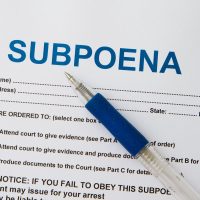What Is a Subpoena and How Is It Used in a Divorce?

Navigating through a divorce can be a complicated and confusing process for those unfamiliar with legal proceedings, as it involves multiple legal documents and complex court procedures. One legal tool you may come into contact with, particularly in a contested divorce, is the subpoena. A subpoena is a legal document issued by a court at the request of a party involved in a legal case, compelling an individual to either produce documents or testify in a court proceeding. In the context of a divorce, subpoenas can play a vital role in gathering necessary information to ensure a fair settlement for both parties. Read on to learn more about subpoenas and their role in California divorce cases, and contact Blasser Law in Claremont for advice and representation in a divorce or other family law matter in Los Angeles or the San Gabriel Valley.
Types of Subpoenas Used in Divorce Proceedings
There are generally two types of subpoenas used in divorce cases:
-
Subpoena Duces Tecum: This type of subpoena requires the recipient to produce specific documents or records. In a divorce, these documents could include financial records, emails, texts, or any other form of evidence that may prove essential in determining asset distribution, child support, or alimony.
-
Subpoena Ad Testificandum: This type requires a person to appear and testify at a deposition or court hearing. This can be crucial when the testimony of a witness (such as a financial expert, a child’s therapist, or a family friend) is needed to clarify issues related to the divorce, such as parenting capabilities or financial matters. This is the most common type of subpoena and is often simply referred to as a subpoena, as opposed to a subpoena duces tecum which is more commonly spelled out to specify its nature and purpose.
How Subpoenas Are Used in Divorce Cases
Subpoenas serve several purposes in divorce proceedings, including but not limited to:
-
Gathering Financial Information: One of the most critical aspects of a divorce is the equitable distribution of assets and liabilities. Subpoenas can compel the disclosure of hidden or undisclosed assets and detailed statements of income, investments, and debts, which are pivotal in fair settlement negotiations.
-
Verifying Income for Support Calculations: Accurate determination of spousal and child support hinges largely on the incomes of both parties. A subpoena can help obtain employment records, bank statements, and other financial data to establish a clear picture of each spouse’s financial standing.
-
Collecting Evidence for Custody Disputes: In cases where child custody is contested, subpoenas can be instrumental in acquiring evidence regarding the parenting abilities and living conditions of each parent. Medical records, school reports, and therapist notes can all be procured through subpoenas to support a parent’s case for custody.
-
Securing Third-Party Testimony: Sometimes, information critical to the divorce case may be held by third parties. Subpoenas ensure that such third parties present relevant information or documents that can influence the proceedings.
The Legal Process Involving Subpoenas
The issuance and handling of subpoenas are governed by strict legal rules. The process typically involves:
-
Filing a Request: The attorney representing one of the spouses files a request for a subpoena in the court where the divorce proceedings are taking place.
-
Court Review and Issuance: The court reviews the request to ensure it is justified and then issues the subpoena accordingly.
-
Service of Subpoena: The subpoena must be legally served to the individual or entity, informing them of the legal obligation to comply.
-
Compliance or Objection: The recipient of a subpoena must either comply with the terms set out or formally object in court, usually citing reasons such as undue burden or overbreadth.
Get Help With the Practical Matters and Legal Issues in Your Claremont Divorce Case
Getting through a divorce is not easy; it is an emotional journey for anyone, on top of being a complex legal proceeding requiring legal knowledge and expertise. At Blasser Law, our experienced family law attorneys are adept at utilizing subpoenas and all available legal tools effectively to advocate for our clients’ rights and interests throughout the divorce process, while also offering practical advice and emotional support. If you are going through a divorce in Los Angeles or the San Gabriel Valley, call Blasser Law in Claremont at 877-927-2181 to ensure your rights and future are protected.



